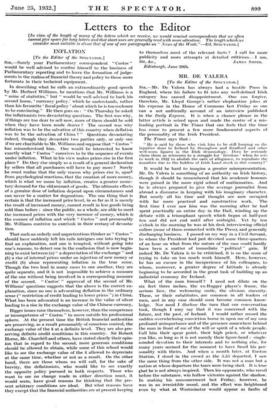Letters to the Editor
[In lien) of the length of many of the letters which we receive, we would remind correspondents that we often cannot give space for long letters and that short ones are generally read with more attention. The length which we consider most suitable is about that of one of our paragraphs on " News of the Weelc."—Ed. SPECTATOR.]
INFLATION
[To the Editor of the SPECTATOR.]
SIR,—Surely your Parliamentary correspondent " Custos " would be well advised to confine himself to the business of Parliamentary reporting and to leave the formation of judge- ments in the realms of financial theory and policy to those more fortunate in their technical equipment.
In describing what he calls an extraordinarily good speech by Mr. Herbert Williams, he mentions that Mr. Williams is a "mine of statistics," but would be well advised to back his second horse, 'currency policy,' which he understands, rather than his favourite fiscal policy ' about which he is too cocksure to be convincing." He then goes on : "On Thursday he asked the inflationists two devastating questions. The first was why, if things are too dear to sell now, more of them should be sold when they have been made dearer ? The second was why inflation was to be the salvation of this country when deflation was to be the salvation of China ? " Questions devastating indeed, though they devastate two parties only, or only one if we are charitable to Mr. Williams and suppose that" Custos " has misunderstood him. One would be interested to know exactly what" Custos " conceives to be the sequence of events under inflation. What in his view makes prices rise in the first place ? Do they rise simply as a result of a general declaration by sellers that all purchasers will have to pay more? Surely he niust realize that the only reason why prices rise is, apart from psychological reactions, that the creation of more money, which is what we mean by inflation, creates a greater mone- tary demand for the old amount of goods. The ultimate effects of a genuine dose of inflation depend upon circumstances and can never be a matter for dogmatism. The one thing that is certain is that the increased price level, in so far as it is merely the result of increased money, cannot result in less goods being sold than before: since the public, as a whole, are able to meet the increased prices with the very increase of money, which is the essence of inflation and which " Custos " and presumably Mr. Williams contrive to overlook in their ecstasy of devasta- tion.
That such an orderly and unpretentious thinker as" Custos " should have suddenly left his rails intrigues one into trying to find an explanation, and one is tempted, without going into one's reasons, to detect one in the confusion that is now begin- ning to exist between (a) " a depreciation of the exchange "and (b) a rise of internal prices under an injection of new money or credit (b) alone representing inflation in the true sense. Though the two lead in many cases to one another, they are quite separate, and it is not impossible to achieve a measure of the one without being involved in a corresponding measure of the second. " Custos' " approval of the second of Mr. Williams' questions suggests that the above is the correct ex- planation, since no one is advocating deflation in the ordinary sense (" restriction of credit leading to lower prices ") in China. What has been advocated is an increase in the value of silver leading to a rise in the exchange value of the Chinese currency.
Bigger issues raise themselves, however, than the competence or incompetence of" Custos " to move outside his professional sphere. At the present time the British financial authorities are preserving, as a result presumably of conscious control, the exchange value of the £ at a definite level. They are also pre- serving definite credit conditions in this country. Sir Robert Borne, Mr. Churchill and others, have stated clearly their opin- ion that in regard to the second, more generous conditions should be allowed to obtain, while some of this school would like to see the exchange value of the £ allowed to depreciate at the same time, whether or not as a result. On the other hand, there are those whom we will call, for the sake of brevity, the deflationists, who would like to see exactly the opposite policy pursued in both respects. Those who want to see no change made in either direction must, it would seem, have good reasons for thinking that the pre- sent arbitrary conditions are ideal. But what reasons have they except that the financial authorities are at present keeping
to themselves most of the relevant facts ? I call for more publicity and more attempts at detailed criticism.—I am,


































 Previous page
Previous page